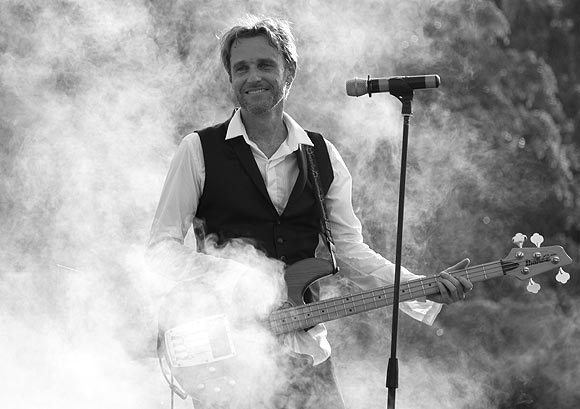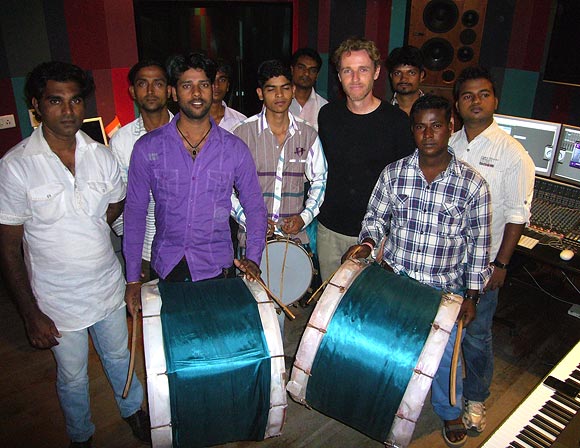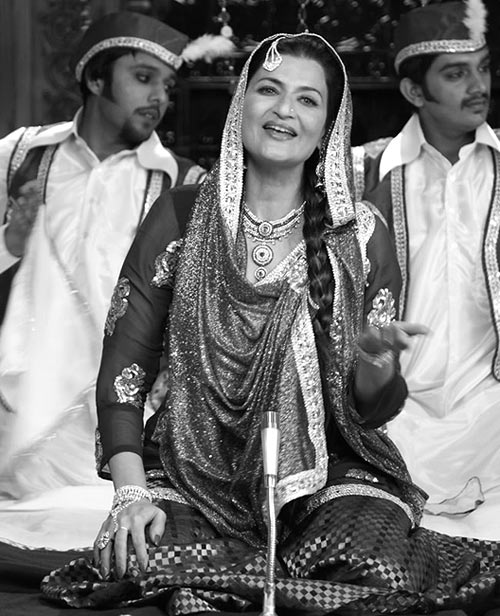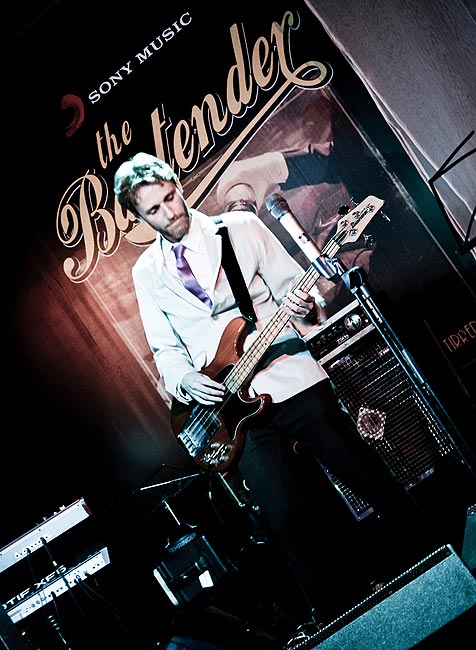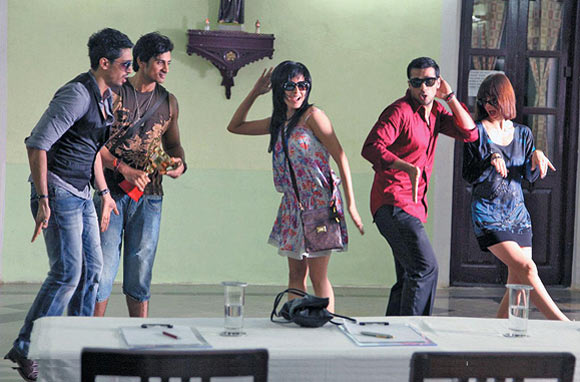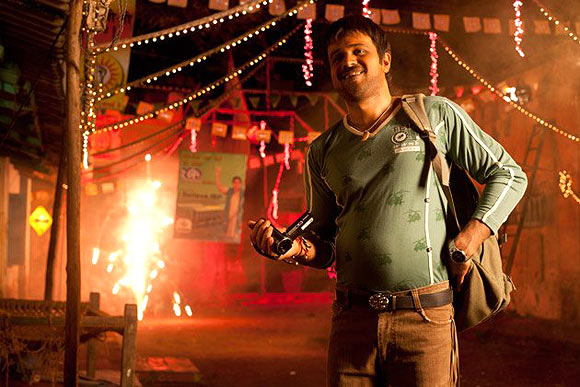 | « Back to article | Print this article |
'Amitabh Bachchan said singing was not his forte'
Mikey McCleary, the Kiwi composer behind the O Lal Meri song in David and Khoya Khoya Chand in Shaitan, speaks to Aseem Chhabra about his unusual musical journey in Bollywood.
Mikey McClearyis a rare face in Bollywood.
Born in India but raised in New Zealand -- his parents are from that country, and holding a British passport -- McCleary made a full circle when five years ago, he shifted to Mumbai to work in the city's music industry.
He originally worked on television commercials, composing music, writing melodies. But that work brought another opportunity for him, to compose music for some of the Hindi cinema's leading indie filmmakers, names like Dibakar Banerjee and Bejoy Nambiar.
Along the way, McCleary produced and composed an album with 10 classic Hindi film songs -- redone with today's voices and musical sensibilities. The Bartender, the album, was a critical and commercial success.
McCleary, 43, spoke to Aseem Chhabra via Skype from his home in Mumbai.
Tell us about your work on Bejoy Nambiar's David. You did the background score as well as worked on a few songs.
It was two films in one. The Tamil version does not have the first story (the one starting Neil Nitin Mukesh). And the two stories that are common in the Hindi and Tamil versions are cut very differently.
There are musical themes that I have used in both and a whole lot of extra music that I have added to the Hindi versions. Plus, I scored the films separately so it has been a lot of work.
I am really proud of the background score since there are some really cool things happening there.
'The Bollywood scores are almost like prop cards for the audience'
I liked the score of your earlier film Shanghai. There was a certain quiet quality to the sound.
Often, Hindi films have such a loud soundtrack, and all the characters have their own soundtracks going on.
What has it been like working with Bejoy and Dibakar Banerjee?
It is different working with every director. I am particularly connected with Dibakar (Banerjee, the director of Shanghai) musically speaking, and his sensibilities.
What you say is correct about a lot of films in Bollywood. The scores are there almost like prop cards for the audience. The filmmakers leave absolutely no doubt about how the audience should react.
I try to avoid doing films, if that's the case.
I also don't like to be very specific that each character should have a theme.
Working with Bejoy has been wonderful. He has a different approach to music in films. One of the things I admire him for is that he takes music from a lot of independent artists who may not be that well known. And he really makes it a soundtrack.
He has an international approach, instead of have one composer do all the songs. He also gives a platform to these bands, since in India there ireally not much space for any music that isn't Bollywood.
There has been a lot of praise for the Lal Meri version of the song you worked on for David. That song has been performed so many times, but you gave a new twist to it.
What was it like working with Rekha Bhardwaj?
When Bejoy asked me to do two versions of that song, I found so many versions on the Internet that I asked him why we were doing this song.
It was a challenge for me because what he had asked for was a folky acoustic version and another very edgy version.
The edgy version could be done and it was unlikely it had been done before. But there are so many folk versions of the song.
I played around with it and came up with a version that I call Calypso. It has a kind of Caribbean feel to it, but I am using quite a few Indian instruments and percussion. So it is sort of Indo-Calypso and very feel good.
Of course, the feel good mood changes when the heavy metal version starts. On the CD, they are two separate songs. I had Rekha record early on for the Calypso version.
For the heavy metal version, I keep the same recording. I wanted the same level of performance, but the music is just completely different.
'Dibakar was one of the key people who introduced me to vintage Bollywood'
W ho choose Rekha Bhardwaj for this song? Was it Bejoy's idea to work with her? She is a terrific singer.
It was Bejoy who suggested working with her. I was happy since I had always wanted to work with her.
I asked her whether if she could come down to my place in Bandra (northwest Mumbai), instead of going to my studio.
We recorded in this small little studio I have in my house. I have some equipment, but it is not soundproofed.
We recorded it as a draft, and then I decided to use that draft itself.
As it often happens in the case when you do a scratch or a rough recording, you catch something you don't want to lose.
So that became our final recording.
She is delightful to work with. She has a very special voice. There is something rustic in her voice that's pretty much what I wanted.
She has sung the song the way it should be sung, rather than doing the vocal part differently.
I liked that she has sung the song quite traditionally, because what I have done with the music is not exactly traditional.
My directions to her were to sing in the rustic and folky way and to push her voice a little to make it feel like that she isn't just singing it to one person quietly. Rather it should feel that she is in a wedding and projecting her voice to the party (in the scene Sarika performs the song at a wedding).
I also did two versions of an English song called Out of Control which is my composition. For the film we have added some Hindi lyrics. The second version is a little quieter.
How did you first work with Dibakar Banerjee?
Sneha Khanwalker (the composer) brought me on to Dibakar's Love Sex aur Dhoka. I had done TV commercial work with Sneha. That was the first time I worked with Dibakar. I produced the songs and then I did the remix of the LSD song.
The first project I did directly for Dibakar was the Coke commercial (with Imran Khan and Kalki Koechlin) with the song Tum Jo Mil Gaye Ho. It's one of the songs on The Bartender album. Dibakar was one of the key people who introduced me to vintage Bollywood.
So it was through Dibakar that I thought of taking old Bollywood songs and instead of remixing them, to reinvent them.
Basically, I am not taking the old song and adding a disco beat. I have done a new version of each song with completely new audio and composition.
The other person who influenced me was (actress and writer) Diksha Basu, who introduced me to Geeta Dutt.
After I had done the Coke song, Diksha encouraged me to do a whole album.
'There is a stunning version of Kabhi Kabhie which we made a music video of'
How did you chose the songs for The Bartender album?
Those were simply the songs that seduced me. I would select songs from old recordings. And then I picked songs that I could do something new and interesting with.
Later when I checked with people, I realised that all the 10 songs were super hits 30 or 40 years ago.
The new version of the song Khoya Khoya Chand from Shaitan -- was that originally done for your album?
Yes. Bejoy called me and said he was looking for a song for his film. He came over to listen to the songs I had worked on. He brought that section he had edited.
We played it over and over again with every song in my album. And Khoya Khoya Chand, orked the closest with the images.
I see you are working on Rohan Sippy's new film Nautanki Saala.
I have finished that. I have done seven songs. Some of them are my compositions and some are new versions of old songs. I have also done the background score.
Also like The Bartender project, I have done another album called B Seventy. It was commissioned for Amitabh Bachchan's 70th birthday. It is a collection of eight of his most iconic songs.
We haven't launched it officially. It will be launched with Mr Bachchan.
All the songs are redone. There is a stunning version of Kabhi Kabhie which we made a music video of. The album is peppier and jazzy as compared to the original The Bartender album.
You didn't ask Amitabh Bachchan to sing the songs?
Well, the thought did come up and I asked him. But he said singing was not his forte. And I wanted to reinvent the songs in The Bartender style, obviously keep true to the soul of the song. Some of these are extremely hard songs to sing.
'I had never thought of India in terms of music work'
My parents were in South India. My father came here in 1957 in the Godavari Delta as part of a Christian mission to study Telugu. He set up a theological college. He and my mother were engaged, writing letters to each other for three years.
In 1960, she took a boat and they were married in Ooty and I was born in Chennai.
I was in Chennai and Bangalore and two years in Dhaka, until I was six. I did my schooling and university in New Zealand and then moved to England.
I got a job at a recording studio in Soho and got into the production side of music for 10 years, before I moved back to India five years ago.
How did that move happen?
One day there was a knock on my door and this man said, "Hello, I'm your new brother-in-law." My sister had gotten married in India and she told me afterwards.
She had married Lucky Ali. This was before he was known as a singer. I ended up doing all his albums.
From that point onwards, I kept going to India every two or three years, to work with Lucky and also A R Rahman.
Had you thought of working in India?
No, I had planned to visit India one day and travel. But I had never thought of India in terms of music work, until I met Lucky.
'I am taking Hindi lessons'
How do you work on Indian films songs, when the lyrics are in different languages?
I am taking Hindi lessons. When I started working with Lucky, I didn't know Hindi at all. So you could say that it is a disadvantage. But I also have the freedom of writing melodies free of the lyrics.
And the same thing that happens with some of the albums like The Bartender -- I wasn't brought up with those songs, so I didn't have a preconceived ideas of what it should be.
It gives me more freedom with the potential of doing something surprising and unexpected.
Have you studied Indian music?
No, but that would be a lifetime of training to master. I also feel that studying Indian classical music may make me lose my instinctive approach to what I do.
So when you moved to India did you have a sense that you could make a livelihood in India?
I knew I could make a livelihood. What I realised was that because I found the work really stimulating and I got into doing music for TV commercials, I push myself to work fast and go with my instincts.
There has been a sea of change. So many Europeans, Americans and other nationals are moving to India.
It has also been easier after I got an OCI (Overseas Citizen of India) card. I qualified for it because I was born in India before a certain cut-off day.
Regardless of my parentage, I was entitled to it. But I had to fight for it. I had to go to a lawyer and then apply in Delhi.
